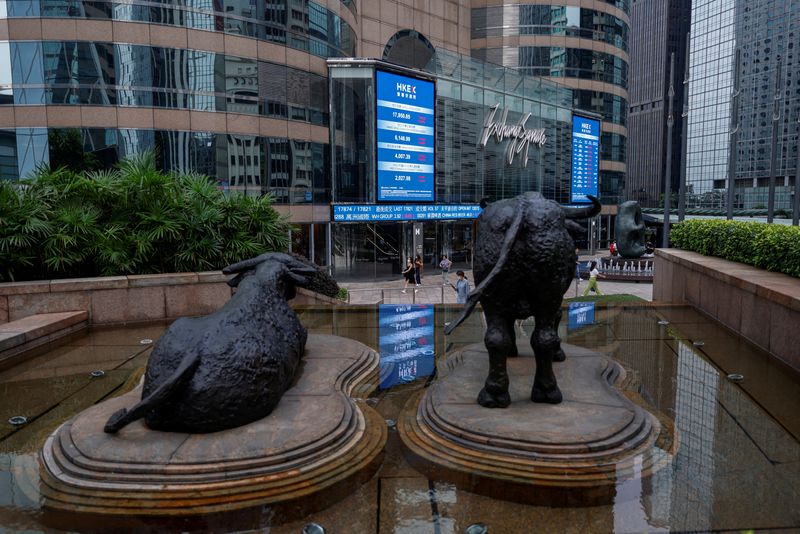By Jihoon Lee and Cynthia Kim
SEOUL (Reuters) - South Korean retail investors have been caught out by an 11% fall in a key Hong Kong stock market index this month, as losses begin to materialise from about 15.4 trillion won ($11.50 billion) of index-linked derivatives that mature this year.
Of the 432.6 billion won of combined products sold by South Korea's major banks that have matured so far in January, there have been losses of 216.4 billion won as of Friday, according to the banks.
The losses have occurred because the Hang Seng China Enterprise Index (HSCEI), a benchmark reflecting the performance of mainland China-based companies listed in Hong Kong, declined below the so-called "knock-in" level, which varies by product.
The structured notes track the performance of the HSCEI and promise bond-like coupons as long as the index does not drop below a certain level. But the HSCEI has more than halved from a February 2021 peak, leaving $11.5 billion of securities pegged to the index at risk of losses, as investor sentiment toward Chinese and Hong Kong shares deteriorated over worries about economic growth.
South Korea's financial watchdog on Jan. 8 began investigating 12 local banks and securities companies that sold the equity-linked securities notes pegged to Chinese stocks to see if there was any wrongdoing in their sales practices.
At that time, the Financial Supervisory Service (FSS) said it had uncovered issues including banks pressuring employees to sell high-risk, complex financial products that are difficult for retail investors to understand.
The regulator estimated huge losses will start to materialise, as roughly 20% of the $11.5 billion of equity-linked securities will mature in the first quarter, and another 32% in the second quarter.
Of the total 19.3 trillion won of such notes sold in South Korea, more than a quarter were bought by people aged 65 or older, according to the regulator.
Lee Hyo-seob, head of the financial services industry at the Korea Capital Market Institute think tank, said the gloom over China assets was in the "vicious cycle."
"The knock-in levels are all different, product by product. And as the index hits a new low, the skepticism over the (HSCEI) index is spreading and that in turn are triggering brokers to hedge, which adds to downward pressure further," Lee said.

"As hedging positions need to be cleared ahead of March and April by when most will mature, sell-off pressure may grow stronger," said a structured notes strategist at Korea Investment & Securities who declined to be named because they were not authorised to speak publicly.
($1 = 1,335.6900 won)